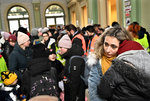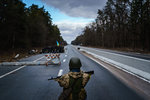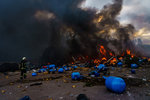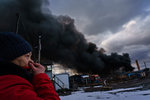




KYIV, Ukraine — World condemnation of Russia’s war against neighboring Ukraine intensified Tuesday as a trickle of trapped civilians from one city made their way toward relative safety, but another agreed-upon pathway, from a battered and encircled seaport, came under Russian bombardment.
Ukraine welcomed the toughening of Western sanctions against Moscow, including President Joe Biden’s announcement Tuesday of a U.S. ban on importing Russian oil. But Ukrainian President Volodymyr Zelenskyy continued to plead for more forceful intervention in a 13-day-old conflict that has produced more than 2 million refugees and shaken world markets.
“Please increase the pressure of sanctions against this country, and please recognize this country as a terrorist state,” Zelenskyy said, blasting Russia in a video speech Tuesday to Britain’s Parliament — a rare honor accorded to a foreign leader.
Zelenskyy reminded Britain of its own struggle against conquest by the Nazis in World War II and, in a deliberate echo of Winston Churchill, said Ukraine would never give in.
“We will continue fighting for our land, whatever the cost. We will fight in the forests, in the fields, on the shores, in the streets,” he told a packed House of Commons, which gave him a standing ovation.
Britain announced Tuesday that it would join the U.S. in taking action against Russian oil, with plans to phase out such imports by the end of the year. And adding to the list of mega-corporations abandoning Russia, McDonald’s announced it was temporarily closing its more than 800 stores in the country.
In announcing the United States' oil ban, Biden castigated Russian President Vladimir Putin for his “murderous path” in Ukraine, but insisted Ukrainians would defend “their freedom, their democracy, their lives.”
Poland announced it was planning to send about two dozen Soviet-era MiG fighter planes to the U.S. air base at Ramstein, Germany. It was not clear if this was meant as a first step in transferring the aircraft to Ukrainian hands, as Zelenskyy has sought, or if it was the Polish government extricating itself from a deal that would be likely to incur Putin’s wrath.
In northeastern Ukraine, residents of the besieged Ukrainian city of Sumy began evacuating through a designated safe corridor Tuesday despite fears that Russian bombing could resume without warning. But another supposedly safe route, from the southern port of Mariupol, came under further shelling that prevented people from finding a way out of the embattled city, Ukrainian authorities said.
NATO Secretary-General Jens Stoltenberg, visiting Latvia, cited credible reports that civilians who were attempting to flee fighting were coming under deliberate fire by Russian forces.
“Targeting civilians is a war crime, and it’s totally unacceptable,” he said.
Also Tuesday, the German federal prosecutor’s office said it had launched a preliminary investigation into possible war crimes carried out by Russian forces in Ukraine. Germany applies the principle of universal jurisdiction to war-crimes cases.
And in jarringly sobering and frank testimony, the director of the CIA, William Burns, and other senior U.S. intelligence officials told Congress that, far from being deterred by the setbacks his army is experiencing, Putin is likely to escalate.
“He’s likely to double down and try to grind down the Ukrainian military with no regard for civilian casualties,” Burns said. “He has no sustainable political endgame in the face of what is going to continue to be fierce resistance from Ukrainians.”
Burns, a former U.S. ambassador to Russia, said Putin calculated that Ukraine was weak and easily intimidated, that his own army would roll in to quick victory, and that he had managed to “sanctions-proof” his economy, and he got it wrong on each score.
“He has been stewing in a combustible combination of grievance and ambition for many years,” Burns said.
The civilians trying to leave their homes in Sumy and Mariupol are part of a startling exodus from Ukraine that has now surpassed 2 million people in less than two weeks, the United Nations said. Relentless Russian assaults have led to snowballing humanitarian crises and a rush to flee Europe’s biggest land war in 75 years.
Whether the shelling and airstrikes will pause long enough to allow out all those who want to escape remains to be seen. Two previous agreed-upon cease-fires quickly collapsed, forcing thousands of people to scurry back to their homes or shelters in cities where drinking water, power, communications and the supply of food and medicine have been disrupted.
And there was no relief for beleaguered areas not covered by the deal to set up so-called humanitarian corridors. The city of Mykolaiv reported new attacks from Russian forces trying to conquer Ukraine’s southern coast, to choke off crucial access to the Black and Azov seas.
The evacuations from Sumy and Mariupol were to begin Tuesday morning after Russian and Ukrainian negotiators agreed on exit routes. Video showed refugees boarding buses in Sumy, a city near the Russian border, with a significant population of foreign students; residents could choose to head south, to the town of Poltava, or to Russia.
From Mariupol, a city of 430,000 people that has been surrounded and pounded for days by Russian troops, buses were given the green light to travel northwest to Zaporizhzhia or to Russia. But Ukrainian officials accused Russian forces of violating the cease-fire with more shelling.
“Russian forces are now shelling the humanitarian corridor from Zaporizhzhia to Mariupol,” Oleg Nikolenko, a spokesman for Ukraine’s foreign ministry, said on Twitter. “Pressure on Russia MUST step up to make it uphold its commitments.”
The setback frustrated the estimated 200,000 Mariupol residents — almost half the city’s population — who are desperate to flee dire conditions that have included accounts of doctors performing emergency procedures without painkillers or antibiotics in hospitals struggling to source basic drugs.
“It’s seven days without any utility, without water, heat,” Mariupol’s deputy mayor, Sergei Orlov, told the BBC. “People want to find something to eat, and it’s difficult.”
Orlov said the constant Russian shelling and rocket fire had destroyed schools, blood-donation stations and other civilian infrastructure, and made it impossible for people even to collect and count the dead.
Deputy Prime Minister Iryna Vereshchuk said that 30 buses had been dispatched from Zaporizhzhia to bring water, food staples and medicines to Mariupol. The buses will be used to ferry out residents who wish to leave, if conditions allow.
Kyiv and Moscow were reportedly negotiating other safe passageways in Ukraine, including out of Kharkiv, the country’s second-largest city, which, like Mariupol, has come under sustained attack as a prized Russian target. Both Ukrainian and Western leaders had lambasted Moscow’s offer Monday of evacuation corridors leading to Russia or its ally Belarus, calling it a cynical move that would deliver refugees to the countries that drove them from their homes in the first place. Belarus served as a launch pad for Russia’s invasion of Ukraine from the north.
In Kyiv, Zelenskyy insisted that he himself was staying put to lead his people and try to secure their safety.
“I’m staying here in Kyiv ... as long as needed to win this war, our national war,” he said Tuesday in one of his frequent video addresses, adding: “Right to life for everyone — that is what we are fighting for in Ukraine.”
Defense Minister Oleksii Reznikov said more than 400 civilian deaths have been recorded so far in the war, including 38 children, although “these data are definitely incomplete.” He also said that Russian attacks have destroyed 34 hospitals, more than 200 Ukrainian schools and 1,500 residential buildings.
The figures could not be independently verified.
Here in Kyiv, residents and soldiers are bracing for an onslaught by the huge column of Russian tanks and armored vehicles that have apparently stalled just north of the city. Western officials believe that the convoy has been plagued by logistical problems, including a shortage of fuel, but that it is trying to regroup to either lay siege to or mount a huge offensive against the capital.
The Ukrainian military said a Russian general was killed in an attack on the convoy. Moscow has not commented on the claim.
In Irpin, a suburb northwest of Kyiv, the opposing forces traded artillery and mortar fire even as civilians continued to evacuate from the area. Russian troops have taken over part of the town, which lies on a vital pathway into Kyiv.
The mayor, Oleksandr Markushyn, said on his official Facebook page that the Russian “occupiers” had delivered a message threatening him and telling him to surrender. “I’m surprised that these monsters still haven’t understood — Irpin doesn’t give up,” he wrote.
Diplomatic efforts have continued even as the fighting rages. The Ukrainian and Russian foreign ministers are expected to hold the highest-level meeting between the two sides Thursday in Turkey. Three rounds of talks by lower-level representatives, the most recent of them on Monday, have seen some progress on humanitarian concerns, but there has been no indication of any political retreat on either side that would end the armed hostilities.
Putin has vowed to carry out his “special military operation” to the end, with only complete Ukrainian capitulation to his demands sufficient for him to stop the fighting. He says Ukraine must “de-militarize,” root out the alleged “neo-Nazis” in its leadership — though Zelenskyy is Jewish — and pledge never to try to join NATO or the European Union.
Kyiv, along with its Western supporters, dismisses those demands as rooted either in fantasy or in an unacceptable denial of Ukraine as a sovereign nation that enjoys the right to decide its own fate and its relationships.
“Every country should have its sovereignty respected,” U.S. Secretary of State Antony J. Blinken said Tuesday during a visit to Estonia on a quick tour through the Baltics to reassure nervous countries sitting in Russia’s shadow. “Every country deserves to be able to make its own choices about its future, policies, with whom it will associate. And that’s what’s at stake when it comes to Russia’s aggression against Ukraine.”
Later, Blinken flew to Paris and met behind closed doors with French President Emmanuel Macron. They “compared notes on ongoing diplomacy” over the Ukraine crisis, the State Department said.